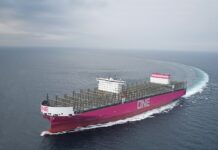
The construction of the Porthos CCS project in Rotterdam’s port area is progressing well, marking the first large-scale CO2 transport and storage initiative in the European Union. Porthos is laying the groundwork for future carbon capture and storage (CCS) projects across northwest Europe.
The project’s commencement was celebrated by key figures, including Rotterdam’s Mayor Ahmed Aboutaleb, Minister of Climate Policy Sophie Hermans, and Mechthild Wörsdörfer, Deputy Director-General of the European Commission for Energy. The CEOs of Porthos’ shareholders—Gasunie, EBN, and the Port of Rotterdam—were also present.
“CCS is crucial to meet climate targets. By building the first large-scale transport and storage system for CO2 in the Netherlands, Porthos is taking a big step. This will allow the industry to reduce emissions and keep a competitive industry here in the Netherlands. I am proud of all the parties who are making this possible,” stated Minister Hermans.
Porthos will transport CO2 from industries in Rotterdam to depleted gas fields beneath the North Sea. Major companies like Shell, ExxonMobil, Air Liquide, and Air Products will supply CO2 to an open-access pipeline in the port area, which will then be transported offshore to a platform and injected into sandstone reservoirs more than 3 kilometres deep.
Recognized as a project of common interest by the EU, Porthos has received US$112 million from the Connecting Europe Facility. The infrastructure being built will support not only Porthos but also future projects like Aramis, potentially enabling the transport of up to 10 million tonnes of CO2 annually.
Moreover, the project is a key step toward developing a broader CO2 network in Northwest Europe, contributing to the European Union’s Industrial Carbon Management Strategy and Net Zero Industry Act.
Additionally, it sets the stage for integrating technologies like Direct Air Capture (DAC) and Bioenergy CO2 Capture and Storage (BECCS) to help achieve negative emissions in the future.
“This project is an important contribution to the goal of a 55% reduction in CO2 emissions in the Rotterdam port area by 2030 and a CO2-neutral port by 2050. It is the start of a CO2 infrastructure in the port that will enable future CO2 storage projects to reduce CO2 emissions and projects to use CO2 as a feedstock. As a European energy port, we are facilitating the development of CO2 infrastructure and connections with neighbouring countries to enable the reduction of CO2 emissions from European industry,” commented Boudewijn Siemons, CEO of the Port of Rotterdam.





